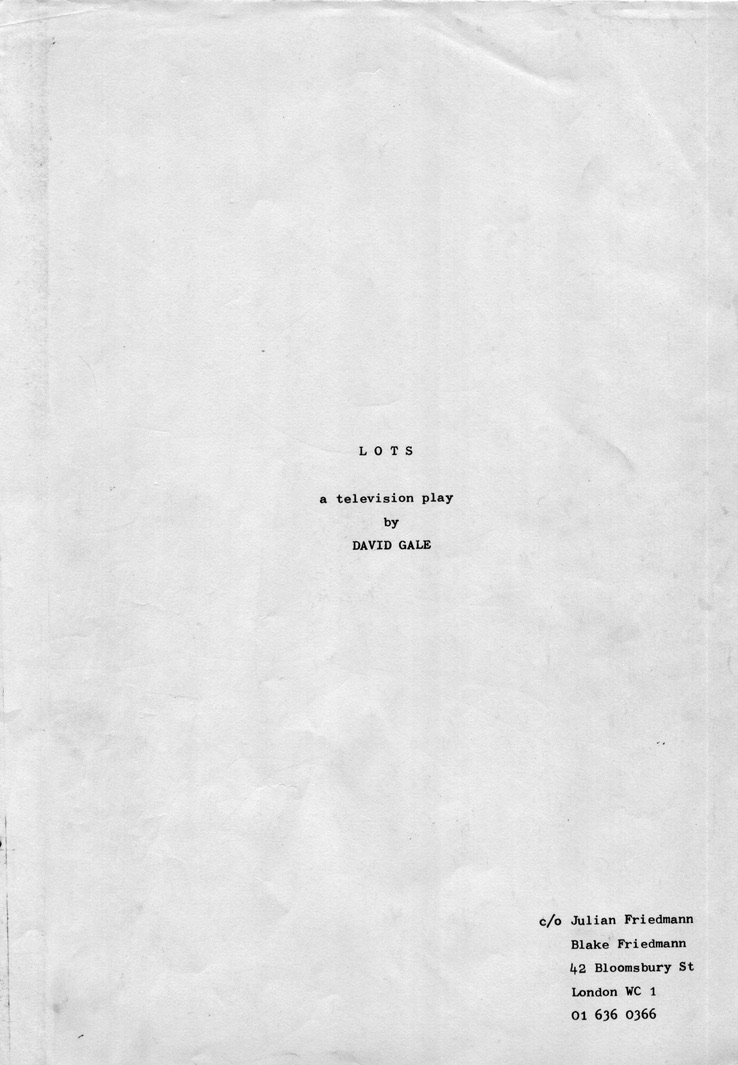Lots: Episode 3

This post is in a series: please start at Episode 1
Let my imagination go. Uhuh. Roger was very likeable and I was flattered by his view that the eccentric work of Lumiere & Son – or something like it – would be viable in the centricity of BBCTV. I would pull out all the stops on this one. I would go where I had not gone before. I had long been irritated – as suggested from time to time throughout Strength Weekly – by the received wisdoms of playwriting, especially those which asserted the primacy of well rounded character, credible dialogue and a good story. While, as a consumer, I was often content to savour the accomplishments of playwrights, screenwriters and novelists who had no axe to grind with regard to these matters, when it came to producing my own stuff I was hardcore and became increasingly so as the years went by.
I mused on the notion of just how much could be removed from performance before it vanished. Peter Brook, of course, had said “A man walks across an empty space, whilst someone else is watching him and this is all that is needed for an act of theatre to be engaged” but it’s not really a night out, is it? Besides, I wasn’t a minimalist, I wanted busy, fast, imagistic theatre.
Then it came to me. One of the wisdoms I had received was that drama could not exist without conflict. Who said? And how dare they? I would write a (television) drama without conflict. I would open the screenplay with some characters facing an insurmountable problem which they would proceed to surmount without developing as characters. Having removed the plot engine about a quarter of the way in I would then guide the characters – the detectives Jean and Max and their client Anna – through a series of situations that delivered modest challenges which were almost immediately resolved for no reason connected either to the nature of the principals or their efforts or some mysterious yet beneficent quality of the phenomenal world. Shit, then, would just happen.
As I noted this down I began to realise that this was what Britain was waiting for: thanks to the perspicacity of Roger, a young 39 year old playwright would storm the small screens of the country with his moreish avant-gardism and quite quickly find a snug abode in the nation’s hearts. He (I) would become the Bleasdale of the New Bleak, the uncompromising author of works of hilarious sad violent beauty that eschewed irritating wisdoms.
Fortunately I have always been calm in the face of heck and was able, despite my dizzying prospects, to continue applying myself to the compositional task. I decided that not only would conflict be removed wheresoever it arose but that the characters would move backwards through time because, as everybody knows, the olden days were so much better in all ways except for medical science in particular anaesthetics. As scenes progressed, the characters’ costumes would regress through the styles of the centuries. Not only that, I decided, but – following my own insistent logic – the species would travel backwards to its origins in the Garden of Eden after which the women would disappear into the mens’ bodies via a wound appearing just below the site of their sixth rib.
Episode 4: The draft is borne into the world. It makes an impression on representatives of the BBC.
09.02.2008

